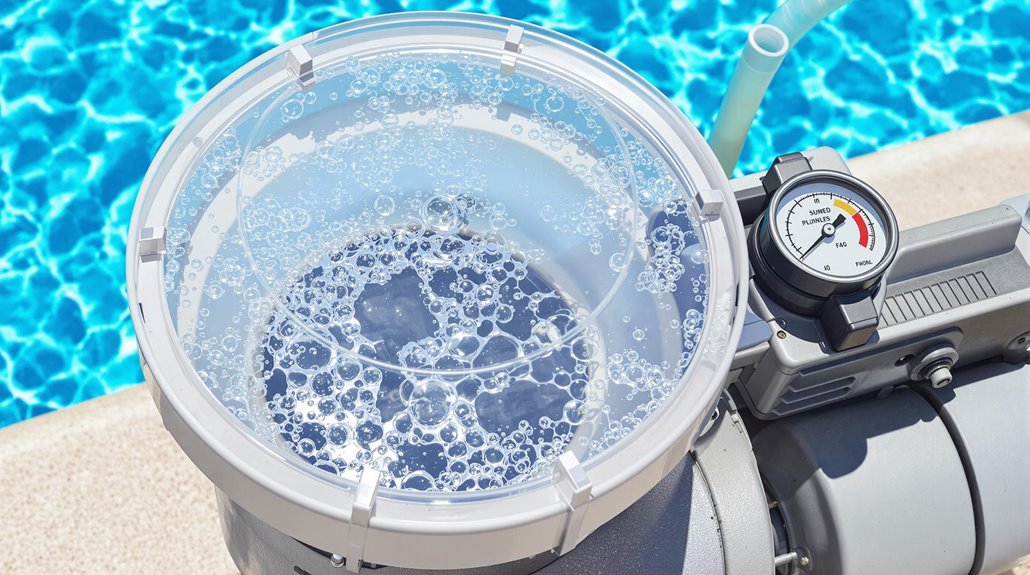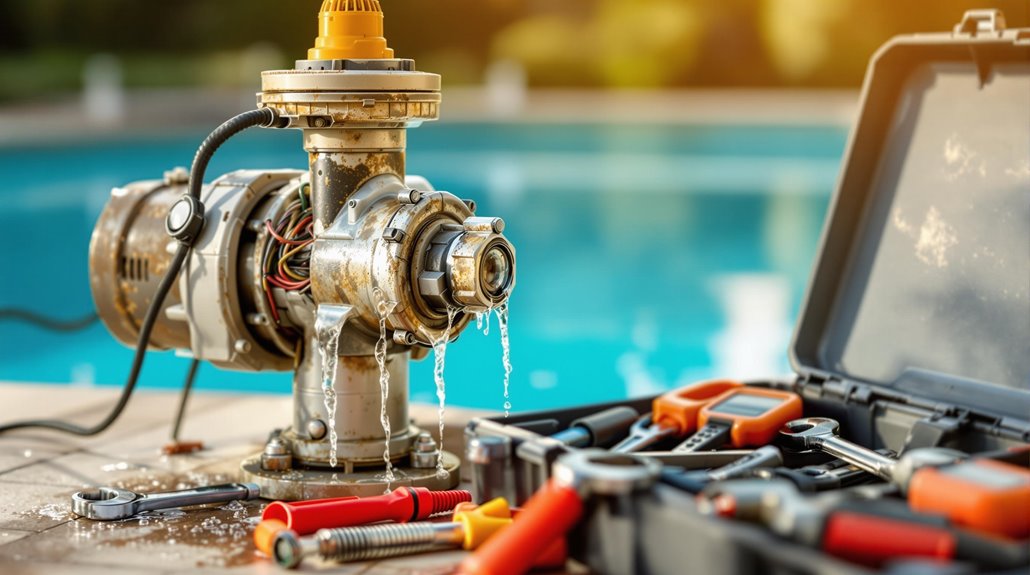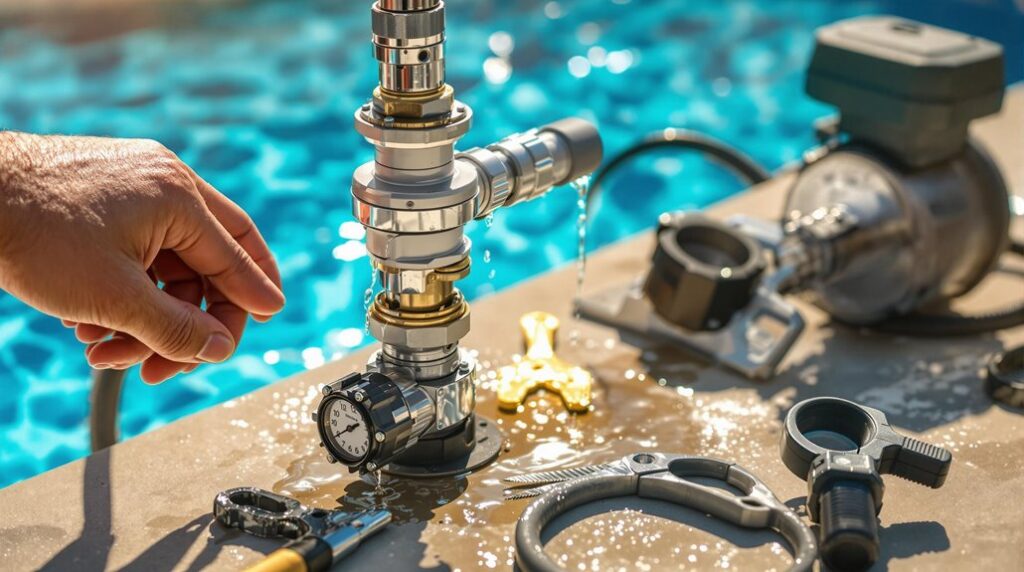If your pool pump is acting up, start by checking for common issues such as unusual sounds, low water flow, or visible leaks. Listen for grinding noises that indicate worn bearings, or humming that suggests capacitor problems. You can troubleshoot basic problems by inspecting electrical connections, testing pressure levels, and examining for air leaks with soapy water. While many issues have DIY solutions, persistent mechanical problems or electrical concerns warrant professional help. Understanding these key indicators will help you maintain your pump’s performance.
Common Signs of Pool Pump Problems

Anyone who owns a pool pump knows it can display various warning signs whenever problems arise. You’ll want to pay attention to unusual sounds, since they’re key indicators of specific issues. Grinding or screeching often means worn-out bearings, while humming points to capacitor problems. If you hear rumbling, check for loose mounting or connections.
Your pump’s performance can also reveal troubles. Watch for recurring shutdowns from overheating, which might stem from blocked vents or circuit overload. Low water flow typically signals clogged filters exceeding 10 PSI or impeller blockages. Air leaks present themselves through bubbles in pool water, empty pump baskets, or hissing sounds. If you notice fluttering in the motor, inspect your system for inconsistent pressure caused by leaks. If you spot consistent water loss around your pump area, this could indicate a significant pool leak requiring immediate attention.
DIY Troubleshooting Steps for Pool Pumps
Once you’ve identified potential pool pump problems, you’ll want to start with basic troubleshooting steps before calling a professional. Begin by checking the electrical connections, ensuring they’re tight and corrosion-free. If your pump starts then immediately shuts off, inspect the capacitor and test voltage levels.
For low water flow issues, examine your filter’s pressure gauge – readings above 10 psi indicate it needs cleaning. Clear any debris from the pump basket and impeller, and check water levels in your skimmer. To detect air leaks, apply soapy water around connections and look for bubbles. Pay special attention to O-rings, replacing any that show signs of wear.
Listen for unusual sounds such as grinding or screeching, which signal bearing problems. If you hear humming without rotation, check for debris blockage or capacitor failure.
When to Call a Professional Pool Technician

While basic troubleshooting might solve common pump problems, certain issues require a professional’s expertise and specialized tools. Once you notice any of these serious matters, it’s time to contact a qualified pool technician:
- Persistent mechanical problems such as loud grinding noises, severe vibrations, or complete pump failure that won’t resolve with basic maintenance
- Electrical issues including frequent circuit trips, motor overheating, or irregular power cycling that could indicate dangerous wiring problems
- Unexplained water loss exceeding 1/2 inch daily, along with visible cracks or consistent pooling around equipment areas
- Multiple symptoms occurring simultaneously, including motor issues combined with unusual sounds and leaks, which often signal complex system failures requiring thorough diagnosis and repair
Year-round maintenance is crucial for preventing equipment failures and maintaining optimal pool safety. Checking your pH balance levels regularly helps prevent pump corrosion and mineral buildup. If your pool water appears cloudy or murky, it could indicate pump circulation problems that need immediate attention. Regular pool filter maintenance helps prevent many common pump issues and extends equipment life. Maintaining your pool heater system is equally important for efficient operation and longevity. Don’t risk damaging expensive equipment or compromising your pool’s safety – get professional help once these signs appear.
Preventive Maintenance Tips for Long-Lasting Performance
Maintaining your pool pump through regular preventive care will greatly extend its lifespan and prevent costly repairs. You’ll want to clean the pump basket weekly and skim your pool’s surface daily to prevent debris from clogging the system. Check and lubricate O-rings monthly with silicone-based grease, and don’t forget to inspect the pressure gauge for any concerning changes. Regular vacuuming helps remove settled debris that could strain your pump system. When chemical tests fail, proper pH levels are essential for protecting your pump components from corrosion.
Keep your water level at the halfway point of the skimmer to avoid cavitation, and listen for unusual noises during operation. Schedule monthly service for pump baskets and strainer pots, and mark your calendar for bi-monthly bearing lubrication. In freezing climates, you’ll need to drain the pump before winter sets in. Remember to test connections with shaving cream to spot hidden air leaks that could affect performance. Starting your pump maintenance in early spring will ensure your system runs smoothly all season. Maintaining crystal-clear water requires diligent pump maintenance combined with proper chemical balance. Using algae treatments regularly can prevent buildup that might clog your pump’s filtration system.
Frequently Asked Questions
How Long Should I Run My Pool Pump Each Day?
Run single-speed pumps 8-10 hours daily. Variable-speed pumps 12+ hours daily. Increase time during heat waves or high usage.
Can I Use My Pool Pump During Winter Months?
Run pool pump 6-8 hours daily in winter. When temperatures fall below 35°F, run continuously to prevent freezing damage.
What Size Pool Pump Do I Need for My Pool?
Pool pump sizing formula:
- Calculate pool volume: length × width × depth × 7.48 = total gallons
- Divide total gallons by 480 minutes = required GPM
- Turnover rate: once per 8-16 hours
Why Does My Pool Pump Make Loud Noises at Night?
Pool pump loud noises at night occur from:
- Worn bearings
- Debris clogs
- Low water levels
These require immediate maintenance to prevent damage.
Should I Upgrade to a Variable-Speed Pool Pump?
Variable-speed pool pumps reduce energy costs 80%, run quietly, last longer, and meet DOE regulations. They provide adjustable filtration rates and digital controls.

